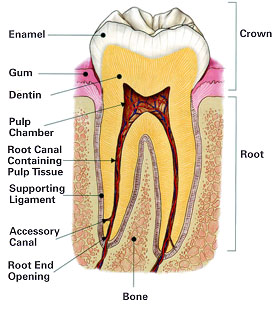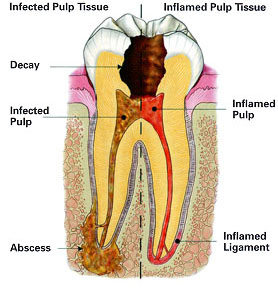FAQ
What is Endodontics?

Endodontics is the specialized dentistry practice which treats the inside of the tooth.
The word “endodontic” comes from the Greek “endo” meaning “inside”, and “odont” meaning “tooth”. Inside the tooth, under the white enamel and a hard layer called dentin, is a soft tissue called pulp. Pulp contains blood vessels, nerves and connective tissue, which extends from the crown of the tooth to the tip of the root(s) comprising the surrounding hard tissue of the tooth.
Endodontic treatment is necessary when the pulp becomes inflamed or infected. The inflammation or infection can have a number of causes: deep decay, trauma, fractures, or repeated dental proce-dures.
Untreated inflammation or infection of the pulp can cause tooth pain, sensitivity to heat or cold, swelling and tenderness in the adjacent gums, discoloration of the tooth, and may lead to abscess.
What is an Endodontist?
An endodontist is a dentist who has undergone a minimum of 2-3 years of additional advanced training in endodontics. Endodontists treat the diseases of the dental pulp and surrounding structures, and diagnose facial pain and related problems.
General dentists sometimes refer patients for consultation when the diagnosis is complicated or when treatment is more difficult than normal. An endodontist can save the tooth, helping to avoid extraction, which is the most common alternative to root canal treatment.
How does endodontic treatment save the tooth?

Endodontic treatment is necessary when the pulp becomes inflamed or infected. Treatment involves removal of the inflamed or infected pulp by carefully cleaning and shaping the inside of the tooth, then filling and sealing the space.
After your root canal therapy has been completed, a report and x-ray will be sent to your general dentist. After treatment, the patient will return to their general dentist, who will place a crown or perform per-manent restoration on the tooth to protect and restore it to normal function. After restoration, the tooth will continue to function as would any other tooth.
Will I feel any pain during or after the procedure?
Fortunately, modern techniques and anesthetics can make the procedure pain-free in most cases. Most patients report that they are comfortable during the procedure and are able to drive home after treatment, and you will probably be comfortable returning to your normal routine.
For the first few days after treatment, your tooth may be sensitive to biting pressure, especially if there was pain or infection before the procedure. This discomfort can be relieved with over-the-counter anti-inflammatory medications, such as Advil, or prescription medications.


